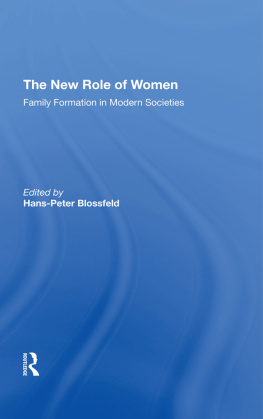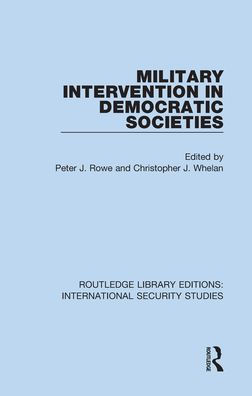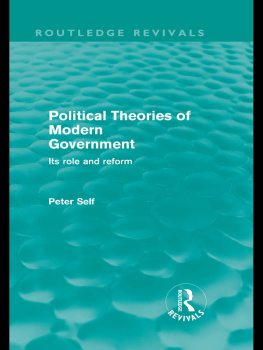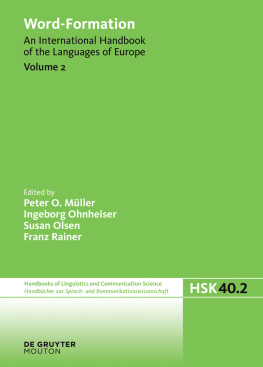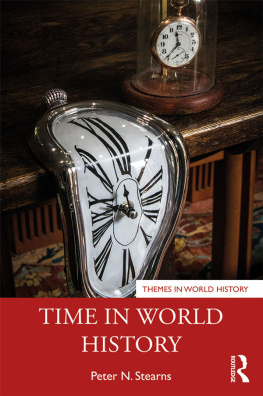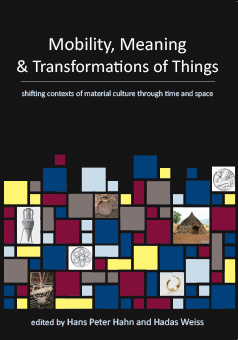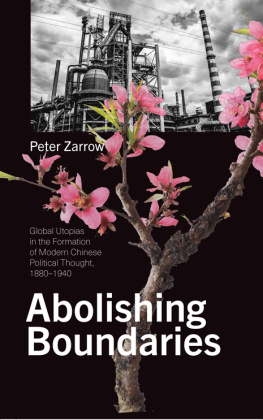The New Role of Women
Social Inequality Series
Marta Tienda and David B. Grusky, Series Editors
The New Role of Women: Family Formation in Modern Societies, edited by Hans-Peter Blossfeld
Social Stratification: Class, Race, and Genderin Sociological Perspective, edited by David B. Grusky
Careers and Creativity: Social Forces in the Arts, Harrison C. White
Persistent Inequality: Changing Educational Attainment in Thirteen Countries, edited by Yossi Shavit and Hans-Peter Blossfeld
The Arab Minority in Israels Economy: Patterns of Ethnic Inequality, Noah Lewin-Epstein and Moshe Semyonov
Equality and Achievement in Education, James S. Coleman
Ethnicity and the New Family Economy: Living Arrangements and Intergenerational Financial Flows, edited by Frances K. Goldscheider and Calvin Goldscheider
FORTHCOMING
Between Two Worlds: Southeast Asian Refugee Youth in America, Ruben G. Rumbaut and Kenji Ima
Prejudice or Productivity: Ethnicity, Languages, and Discrimination in Labor Markets, M.D.R. Evans
Social Differentiation and Social Inequality: Essays in Honor of John Pock, edited by James Baron, David B. Grusky, and Donald Treiman
Education and Social Class in Comparative Perspective, edited by Robert Erikson and Jan O. Jonsson
Inequality and Aging, John Henretta and Angela ORand
Children, Schools, and Inequality, Doris R. Entwisle and Karl Len Alexander
First published 1995 by Westview Press
Published 2019 by Routledge
52 Vanderbilt Avenue, New York, NY 10017
2 Park Square, Milton Park, Abingdon, Oxon OX14 4RN
Routledge is an imprint of the Taylor& Francis Group, an informa business
Copyright 1995 Taylor& Francis
All rights reserved. No part of this book may be reprinted or reproduced or utilised in any form or by any electronic, mechanical, or other means, now known or hereafter invented, including photocopying and recording, or in any information storage or retrieval system, without permission in writing from the publishers.
Notice:
Product or corporate names may be trademarks or registered trademarks, and are used only for identification and explanation without intent to infringe.
Library of Congress Cataloging-in-Publication Data
Blossfeld, Hans-Peter
The new role of women : family formation in modem societies / edited by
Hans-Peter Blossfeld.
p. cm. (Social inequality series)
Includes bibliographical references.
1. FamilyLongitudinal method. 2. WomenEmployment
Longitudinal method. I. Title. II. Series.
HQ518.B6335 1995
306.85dc20
94-46250
CIP
ISBN 13: 978-0-367-29439-7 (hbk)
Contents
, David B. Grusky and Marta Tienda
PART ONE
INTRODUCTION
, Hans-Peter Blossfeld
PART TWO
COUNTRY-SPECIFIC STUDIES ON THE TRENDS IN FAMILY FORMATION AND THE NEW ROLE OF WOMEN
, Britta Hoem
, Hans-Peter Blossfeld and Gtz Rohwer
, Henri Leridon and Laurent Toulemon
, Jenny de Jong Gierveld and Aart C. Liefbroer
, Kathleen E. Kiernan and va Lelivre
, Valerie Kincade Oppenheimer,Hans-Peter Blossfeld, and Achim Wackerow
, Antonella Pinnelli and Alessandra De Rose
, Margarita Delgado
, Peter Robert and Hans-Peter Blossfeld
PART THREE
DISCUSSION OF RESULTS AND CONCLUSIONS
, Annemette Srensen
, Valerie Kincade Oppenheimer
PART FOUR
HOW THE OTHER HALF LIVES
, Johannes Huinink
Guide
The second demographic transition has taken the form of secular declines in rates of entry into marriage and motherhood coupled with rising rates of unmarried cohabitation. These trends have been interpreted variously, but the prevailing view seems to be that the family and its associated institutions have become less attractive to women as they accumulate increasing amounts of work-related human capital and enter the formal labor force in record numbers. As Gary Becker argues in A Treatise on the Family , the opportunity costs of marriage and motherhood are often prohibitively high for educated women, since their (potential) earnings are foregone in the context of families with a traditional sex-based division of labor. The independence hypothesis of Becker has attracted much scholarly fanfare, but until now it has not been subjected to rigorous cross-national and longitudinal analysis.
In this pathbreaking volume, Hans-Peter Blossfeld and his colleagues provide a long-awaited test of the independence hypothesis. The simple premise underlying their analyses is that educational investments may not always depress rates of family formation because there is much variability within the modern world in the extent to which these investments have an economic payoff within the family and are therefore attractive to women intending to marry and have children. Although highly educated women in all countries will likely postpone marriage while still in school, it is only in traditional countries (in which work and family cannot be readily combined) that Blossfeld expects such women to continue to delay marriage and motherhood even during the post-schooling period. The analyses presented here are largely consistent with the foregoing revision and elaboration of the independence hypothesis. The publication of this volume therefore marks the coming of age of a distinctively sociological approach to the second demographic transition; that is, the analyses featured here suggest that trends in family formation cannot be understood exclusively in terms of individual-level investments, if only because the institutional context in which these investments may be realized is cross-nationally quite variable.
The strength of this effort owes much to its hybrid methodology that combines the benefits of scholarly collaboration with the sharply focused intellectual agenda typically found only in authored research monographs. As Blossfeld outlines in the preface to this volume, the collaborators were all ).
This volume should be required reading for all sociologists who are losing faith in the discipline and its many achievements. If there is indeed a disciplinary malaise, it may be partly attributable to the wide terrain of subjects that sociologists cover and the relatively slow progress that can therefore be anticipated on any single front. In this regard, the great virtue of the research model fashioned here is that it galvanizes some of the top scholars in the field around a single intellectual problem, thereby making rapid and immediate progress possible. We are most pleased to welcome the resulting volume into the Social Inequality Series.
David B. Grusky
Stanford University
Marta Tienda
University of Chicago
This is an international comparative study on changes in the process of family formation and the new role of women in modern industrial societies. We used longitudinal data to examine the validity of the common view that womens growing economic independence has had a critical and presumably irreversible impact on the family system in modern societies.
The notion that the sexual division of labor in the family and in the labor market produces interdependence and organic solidarity was first presented by Emile Durkheim. It was further advanced by William J. Goode, Robert F. Bales, and Talcott Parsons in their structural-functionalist approach, in which they assumed that the traditional sex-role differentiation is important for the stability of the family and even for modern society itself. Parsons in particular believed that men specialize in gainful employment and women in work within the family to prevent disruptive competition between the spouses. More recently, the importance of sex-specific roles for the stability of the family system was also stressed in the new home economics. Gary S. Becker, its main proponent, argued that growth in the earning power of women in modern societies is the most important factor in the long-term decline of marriage and fertility. According to Becker, womens growing earning power not only reduces the appeal marriage has held for men and women (because the sexual division of labor is less advantageous for both sexes), it also increases the value of the mothers time, raising the relative costs of children and thereby reducing the demand for children.

